Enhancing Pet Bird Care with Water Fountains

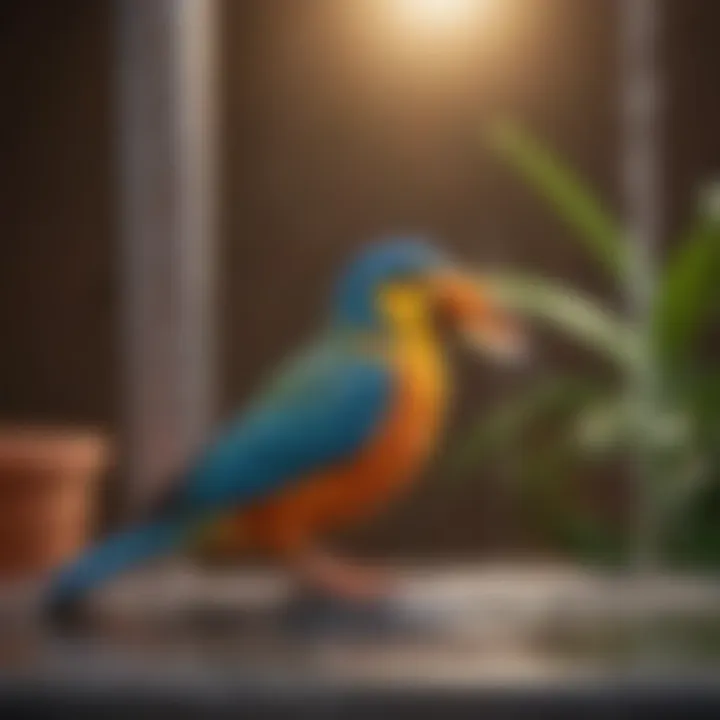
Intro
Providing proper care for pet birds goes beyond offering them a cage and some seeds. One crucial aspect often overlooked is their hydration needs. Water fountains specifically designed for pet birds can significantly impact their well-being. These fountains promote not only physical health through hydration but also encourage natural behaviors, making them a delightful addition to any aviary setup.
In this article, we will explore various dimensions of water fountains in the context of pet bird care, discussing the essential benefits of proper hydration, the different types of available fountains, as well as maintenance advice to keep these fixtures in optimal condition. Our goal is to create a comprehensive resource for both aspiring bird owners and seasoned enthusiasts, detailing effective practices in care and soothing rituals that can enhance their companions' lives.
Care Tips
Daily Care Routines
Establishing a daily routine is vital for pet birds. This includes not only feeding but also ensuring fresh water is always available. Using a fountain can simplify this task. These fountains continually circulate water, ensuring it stays clean and fresh. Bird owners should check the fountain every morning to ensure it is functioning properly and refill it as needed.
Cage Setup and Maintenance
The placement of the water fountain is important. It should be positioned at a height accessible to the bird but away from direct sunlight. Additionally, it must not be near food sources to prevent contamination. Regular maintenance of the fountain is crucial. Depending on the model, cleaning should occur at least once a week to prevent algae growth and ensure hygiene.
Hygiene and Cleaning Practices
Cleaning the water fountain should be systematic. Owners can use a mild vinegar solution to clean the interior and exterior. Be sure to rinse thoroughly to eliminate any residue. It’s recommended to use non-toxic cleaning supplies, as birds are sensitive to harsh chemicals. Establishing a cleaning schedule can help ensure that the fountain remains a safe water source.
Seasonal Care Adjustments
Changing weather conditions can affect hydration needs. In warmer months, birds may require more water due to increased evaporation and consumption. Adjust the fountain accordingly and consider adding ice cubes to help keep the water cool. Monitoring your bird's drinking habits and adapting is important during seasonal transitions.
Behavioral Insights
Understanding Bird Body Language
Birds communicate their needs through body language. When they are frequently near the water fountain, it indicates they may be thirsty or enjoy bathing. Observing their behavior can provide insight into whether the water fountain satisfies their needs.
Common Behavioral Issues and Solutions
Some birds may develop a preference for stagnant water over flowing sources. Introducing them gradually to a fountain, perhaps by placing their favorite perching spot nearby, can help transition them. It's important to be patient and understand that behavior may not change overnight.
Positive Reinforcement Techniques
Using treats to encourage your bird to use the fountain can be effective. When they approach the fountain, offering them a favorite treat reinforces the idea that it is a good source of hydration. This psychological aspect can greatly improve their comfort with the feature in their environment.
Social Interaction Needs
Birds are social creatures. Drinking together at a water fountain can promote bonding between multiple birds. Observing birds drinking in a group may reveal natural social behaviors, as they often engage in conversation while they hydrate.
Nutrition Guides
Essential Diet Components
A balanced diet is essential. While water fountains help with hydration, ensuring birds have diverse food sources is crucial. Seeds, fresh fruits, and leafy greens should all be included in their daily diet to complement hydration.
Safe and Toxic Foods
It is vital to recognize what foods are safe for birds. Common fruits like apples and bananas are safe, while avocado and chocolate should be avoided. Providing safe treats in conjunction with the fountain can enhance their dietary variety while ensuring safety.
Supplements and Treats
Depending on the species, dietary supplements may be necessary. Offering vitamin-rich treats can support overall health. Just as with regular food, ensure any offered treats are suitable for birds to prevent adverse health effects.
Feeding Strategies for Different Species
Each bird species has unique dietary requirements. Researching specific needs or consulting a veterinarian ensures optimal nutrition and hydration practices are in place, enhancing each bird’s quality of life.
Wellness and Health
Routine Health Checkups
Regular vet visits are necessary to monitor health. During checkups, discussing hydration habits can provide insight into any underlying issues. The vet can suggest adjustments to water routines or fountain types based on specific needs.
Identifying Symptoms of Illness
Observing behavior changes is critical. Signs of illness can include excessive drinking or lethargy. A functional water fountain can help highlight drinking trends, making it easier to spot deviations from their normal habits.
Preventative Care and Vaccinations
Preventative care, including vaccinations, is vital. Ensuring a clean drinking source, such as a well-maintained fountain, contributes to overall health and prevents potential illnesses that can arise from contaminated water.
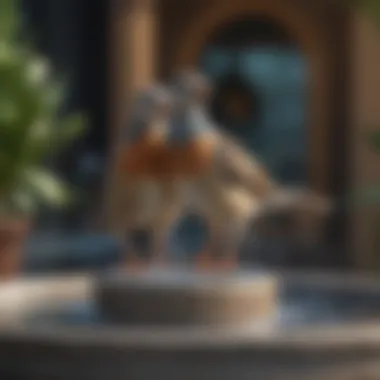
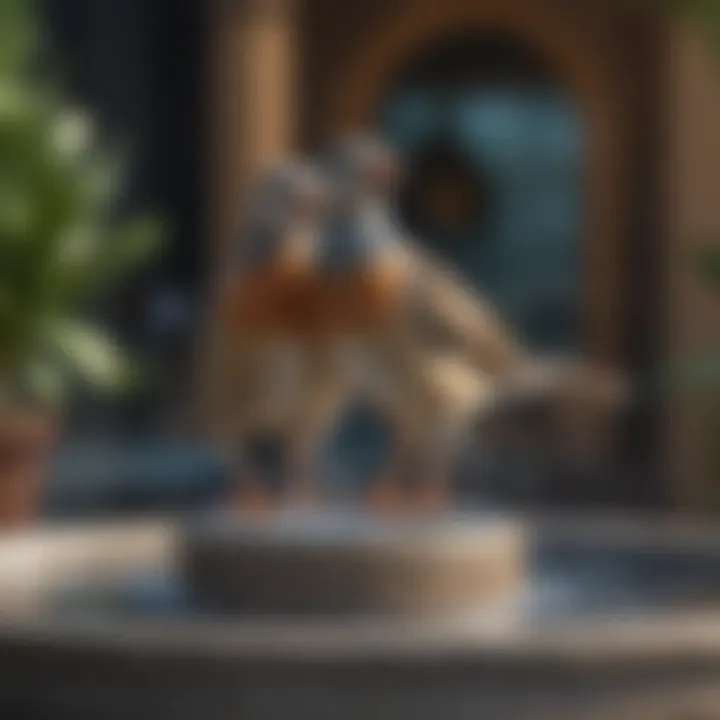
Mental and Emotional Well-being
Providing birds with a habitat that nourishes both physical and mental well-being is essential. Water fountains can contribute to emotional comfort by creating a calming environment that encourages natural behaviors like bathing and foraging.
Enriching Activities
Toys and Playtime Ideas
Incorporating toys and interactive elements near the water fountain can stimulate play. Birds enjoy engaging with their surroundings, and a fountain can become the centerpiece of their activities.
Training and Tricks
Training sessions around the fountain can reinforce positive behaviors. Birds can learn to enjoy their water source while also developing cognitive skills through interaction.
Outdoor Activities and Interaction
Bringing the fountain outside during warm days can enhance outdoor playtime. Fresh air, combined with access to water, promotes a healthy lifestyle for your birds. Ensure safety measures are in place to protect them from predators.
DIY Projects for Mental Stimulation
Creating DIY projects related to the fountain can stimulate cognitive function. Simple puzzles involving water or finding hidden treats near the fountain can provide additional engagement in a bird's daily life.
Preface to Water and Birds
The discussion of water and birds is critical when it comes to the well-being of pet birds. Water serves as a vital resource, underpinning numerous biological functions in avian species. It aides in digestion, helps regulate temperature, and supports overall health. Yet, many pet owners may overlook the specific needs their feathered companions have regarding hydration. Understanding these nuances is essential in fostering a thriving environment for pet birds.
Importance of Water for Pet Birds
Water is not merely a necessity for survival; it is a fundamental component of a pet bird's habitat. Birds require a consistent supply of clean water for drinking and bathing purposes. Inadequate hydration can lead to serious health problems. For instance, dehydration can impair vital bodily functions, affect plumage condition, and lead to reduced activity levels. Moreover, the quality of the water is equally important. Contaminants can pose severe health risks. Thus, pet owners need to ensure access to fresh and hygienic water every day.
"Providing an adequate water source is just as crucial as proper nutrition when caring for pet birds."
Natural Drinking Habits
Birds in the wild exhibit distinct drinking behaviors that highlight their needs. Unlike the static nature of water bowls, birds tend to enjoy the dynamic features of water sources. In natural settings, they often seek water from streams, ponds, or rainwater collected on leaves. This instinct influences their behavior and interaction with water in captivity. Using water fountains can mirror these natural drinking habits, encouraging birds to engage with their environment in a more instinctual manner. When offered a flowing source, birds might display increased interest and curiosity, leading to healthier drinking patterns. This not only enhances their hydration but also stimulates mental activity, which is essential for their overall welfare.
Understanding Water Fountains
Water fountains play an essential role in the care of pet birds. They ensure that birds have a constant supply of clean water. This is crucial for their health and well-being. A water fountain can mimic natural sources found in the wild, encouraging birds to drink more water. Therefore, understanding the types and purposes of these fountains is necessary for any responsible bird owner.
Definition and Purpose
Water fountains are specially designed devices that provide a continuous flow of fresh water. Their primary purpose is to supply hydration to pet birds. Unlike traditional water bowls, fountains reduce the likelihood of water becoming stale or contaminated. They also help maintain water temperature, making it more appealing for birds to drink. This feature is particularly important during warmer months when birds are more prone to dehydration. Regular access to fresh water supports not only hydration but also physical health, impacting features like feather quality and overall vitality.
Different Types of Water Fountains
Choosing the right water fountain for your pet bird involves examining various types available in the market. Each type has its benefits and considerations.
Gravity-Feed Fountains
Gravity-feed fountains operate on a simple principle, using gravity to draw water from a reservoir. This design ensures that water is replenished as your bird consumes it. One key characteristic of gravity-feed fountains is their simplicity. There are no moving parts, which reduces the risk of mechanical failure. This makes them a popular choice among pet bird owners.
The unique feature of gravity-feed fountains is their ability to hold a larger volume of water compared to standard bowls. However, they do require regular cleaning to prevent algae buildup. If hygiene is not maintained, water quality may suffer.
Electric Fountains
Electric fountains offer a more high-tech solution for bird hydration. They usually contain a pump that circulates water continuously. One notable advantage of electric fountains is their ability to filter water, removing impurities that could harm your bird's health. These fountains often have adjustable flow rates, allowing owners to customize water output suitable for their pet.
Despite their benefits, electric fountains do require access to a power source. They also demand more maintenance compared to gravity-feed fountains because of the pump and filter mechanisms. This translates to additional time and effort for pet owners.
Solar-Powered Options
Solar-powered fountains represent an eco-friendly alternative. They utilize solar panels to power the water circulation, making them energy-efficient. This type of fountain is ideal for outdoor aviaries as they do not require grid electricity. A key characteristic is their independence from conventional power sources, offering convenience for those keeping birds in sunny environments.
However, solar-powered fountains may not deliver consistent performance in cloudy weather or during winter months when sunlight is limited. It is crucial to assess at which times of year the fountain will be used most. Also, the efficiency of these fountains can vary based on their design and the solar panel's size.
Understanding the various types of water fountains available can help bird owners make informed choices. Choosing the right fountain ensures a sustainable and beneficial hydration source for their beloved avian companions.
Benefits of Water Fountains for Pet Birds
Water fountains play a critical role in ensuring the health and well-being of pet birds. Their design and functionality cater specifically to the hydration needs of various avian species. In addition to providing a foundation for proper hydration, water fountains offer several important benefits that directly impact the behavior, stress levels, and overall quality of life for these intelligent creatures.
Consistent Access to Clean Water
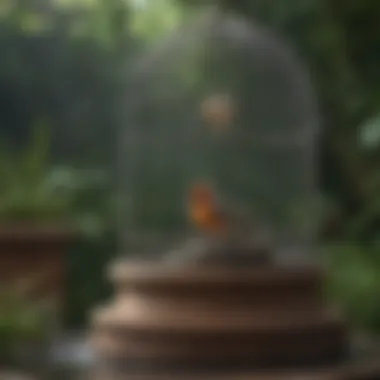

One of the fundamental advantages of water fountains is that they provide consistent access to fresh and clean water. Unlike traditional bowls, which can become contaminated quickly, fountains often come equipped with filters. This filtration system ensures that the water remains pure, helping to prevent the growth of harmful bacteria and pathogens. Birds, especially species like parrots and finches, are sensitive to water quality. Hence, having a fountain can significantly decrease the risk of gastrointestinal issues stemming from dirty water.
Additionally, fountains can help maintain water levels automatically with various designs. This feature means that owners will not have to constantly refill bowls throughout the day, thus reducing the chance of birds becoming dehydrated when left unattended for brief periods. Consistent access not only mitigates health risks but also encourages birds to drink more regularly.
Encouragement of Natural Drinking Behaviors
Birds have evolved to drink water in specific ways, often preferring moving water sources. Fountains simulate natural environments found in the wild where birds can drink from streams or ponds. This mimicking of natural drinking habits helps trigger instinctive behaviors. Many birds are more likely to engage with a fountain, rather than a stagnant bowl. The flowing water attracts their attention, encouraging them to approach and drink.
Moreover, observing their drinking habits can be fascinating for bird owners. When birds use a fountain, it allows their natural behavior to be more visibly appreciated, transforming the interaction from a mundane task into an engaging experience. Recognizing how your bird interacts with the fountain can provide insights into their health and hydration needs, ensuring that both the owner and the pet maintain optimal wellness.
Reduction of Stress Levels
Water fountains can help alleviate stress for pet birds. Stress in birds can manifest in various ways, including feather plucking and aggressive behaviors. A reliable water source, such as a fountain, creates a sense of stability in an environment that might otherwise feel chaotic. By knowing that clean water is always available, the birds can feel secure. This peace of mind contributes to overall well-being.
In addition, the aesthetics and sounds associated with water fountains can also create a calming atmosphere. The gentle trickle of flowing water can be soothing for both birds and their owners alike. The presence of a fountain in their living space offers birds an opportunity to engage in a comfortable yet stimulating environment.
In summary, water fountains are not just functional but serve multi-faceted roles in enhancing pet bird care. They ensure the provision of clean water, promote natural drinking behavior, and subsequently reduce stress levels in avian companions. Transitioning to the appropriate fountain can lead to significant improvements in both the physical health and mental wellness of birds.
Choosing the Right Fountain for Your Bird
Selecting the right fountain for your pet bird is crucial for ensuring their hydration and overall health. Birds rely heavily on water for various bodily functions. Understanding the unique needs of your avian companion will aid in making the correct choice. A suitable fountain not only provides water but also promotes healthy behaviors, contributing positively to their environment.
Considerations for Species-Specific Needs
Different bird species have distinct habits and requirements when it comes to hydration. For example, smaller birds like parakeets may prefer more shallow drinking sources, whereas larger species like cockatoos may need deeper fountains. It's important to take into account the specific drinking habits of your bird.
- Size matters: Smaller birds may drown in deeper fountains.
- Behavior: Some birds enjoy playing in water, while others prefer just drinking. Understand your bird's behavior to select a fountain that matches it.
- Species-Specific Needs: Research your bird's natural drinking habits. For instance, finches may require a more stationary fountain, while larger birds may benefit from moving water to encourage drinking.
Size and Design Factors
The size and design of the fountain play a significant role in its effectiveness. A well-designed fountain should not only fit within your bird's cage but must also be accessible and easy to use.
- Dimensions: Ensure the fountain is the right height for your bird to access easily without having to stretch or struggle.
- Design: Holes or areas for birds to perch while drinking could encourage them to try the fountain more often. An aesthetically pleasing fountain can also enhance the environment.
- Water Flow: Some birds are attracted to moving water. Choosing a fountain with a slight current may encourage your pet to drink more, as they feel drawn to the flow.
Materials and Safety Standards
When choosing a fountain, material quality is vital for your bird's health. A fountain should be made from non-toxic materials that are safe for birds. The following considerations should be kept in mind:
- Non-toxic Plastics: Ensure that any plastic used is food-grade and free from harmful chemicals.
- Sturdy Construction: The fountain should be durable enough to withstand your bird’s interactions. It should not easily tip over or break.
- Cleanliness: Materials that are easy to clean help prevent the growth of bacteria and keep the water fresh.
Selecting a fountain that meets safety and health standards is essential for the well-being of your pet bird. Regular maintenance is just as crucial to ensure their hydration sources remain safe and clean.
Choosing the right fountain impacts your bird's hydration, happiness, and health. Understanding their specific needs, alongside size, design, and materials, will help you make an informed choice that leads to a thriving avian companion.
Maintenance of Water Fountains
Maintaining water fountains is a crucial aspect of pet bird care. It ensures that the water remains clean, fresh, and safe for the birds. Regular maintenance prevents bacterial growth and keeps the fountain in good working condition. Ignoring maintenance can lead to health issues for the bird as well as deterioration of the fountain itself. Proper care extends the life of the product and enhances its usefulness.
Regular Cleaning Protocols
Establishing a routine for cleaning water fountains is necessary. It is recommended to clean the fountain at least once a week. This schedule might vary based on the number of birds and their activity levels. After each cleaning:
- Empty the fountain and disassemble it if possible.
- Wash all parts with warm, soapy water. Use a brush to reach difficult areas.
- Rinse thoroughly to remove any soap residues that might irritate the birds' skin.
- Disinfect the fountain occasionally with bird-safe disinfectants. Always ensure that the disinfectant is fully rinsed off.
Such practices will help maintain not only cleanliness but also the aesthetic value of the fountain, ensuring it fits well in the living space of the birds.
Water Quality Management
Managing water quality is equally important. Stagnant water can quickly become a breeding ground for bacteria. Here are some key points to consider:
- Change the water daily to ensure it is fresh.
- Use filtration systems if available, as these can help reduce impurities.
- Treat the water with appropriate hydration solutions if necessary, but consult a vet to avoid any reactions.
Good water quality is essential for your birds’ overall health. Monitoring water clarity and smell provides insight into its quality.
Checking for Wear and Tear
Regular inspections for wear and tear can prevent potential issues before they arise. Look for signs of:
- Cracks or leaks in the fountain. These can affect functionality and lead to water wastage.
- Deteriorating parts that may need replacement. Plastic components can become brittle over time.
- Electrical faults if it is an electric or solar-powered fountain. Make sure to look for frayed cables or signs of damage.
Promptly addressing these signs will not only enhance the fountain's longevity but also ensure the safety of your pet birds. A well-maintained fountain aligns with the broader objectives of providing a healthy living environment for your feathered companions.
Integrating Fountains into Bird Environments
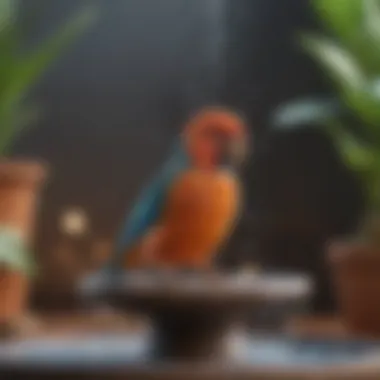
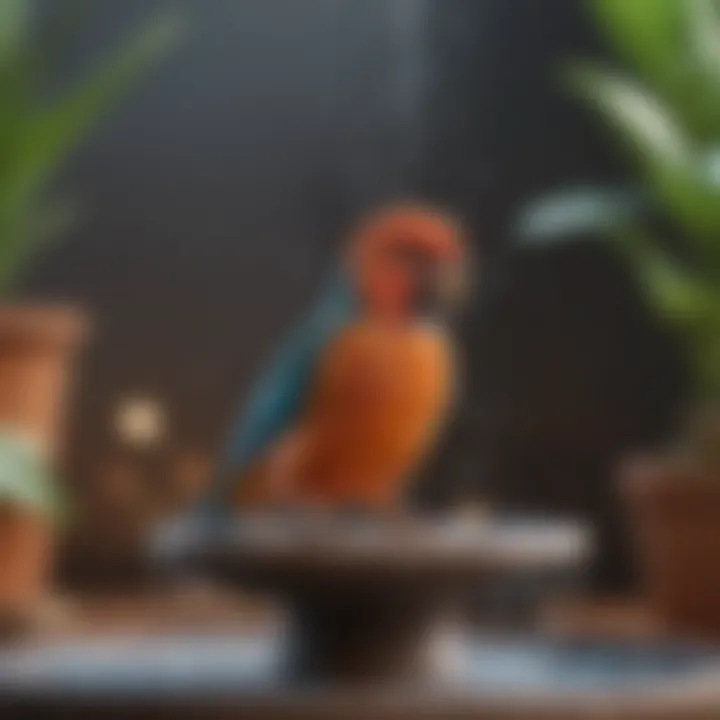
Integrating water fountains into the living environments of pet birds is a crucial step that goes beyond mere aesthetics. This practice fosters a habitat that is both engaging and supportive of natural behaviors. Water fountains serve not only as hydration sources but also as fixtures that can enhance the well-being of birds through their interaction with moving water.
By creating a stimulating environment, bird owners can observe their pets engaging in natural drinking behaviors while benefiting from a reliable water source. The placement and design of these fountains play a vital role in achieving these objectives.
Placement Considerations
When positioning a water fountain, several factors must be taken into account to optimize its effectiveness. First, ensure that the fountain is easily accessible for the birds. Birds should not struggle to reach the water, which can lead to hydration issues. Secondly, avoid placing the fountain too close to the bird's food sources to prevent contamination. Situating it at a slight distance encourages healthy drinking habits while keeping the feeding area clean.
Additionally, consider the height of the fountain. Different species have varying preferences when it comes to drinking. For smaller birds like budgerigars or finches, lower fountains are more suitable. Larger birds may prefer higher placements. This attention to detail can make a significant difference in how often and comfortably birds engage with the fountain.
Lastly, consider the social dynamics of your bird environment. If you have multiple birds, ensure that there are enough fountains to avoid competition. If one bird dominates the water source, others may become stressed or dehydrated. Providing multiple fountains promotes a calm and balanced habitat.
Enhancing Aviary Design with Fountains
Fountains can also serve as eye-catching features in an aviary design. A well-placed fountain can become a central point of interest, drawing both human and avian eyes. The sound of running water can create a tranquil atmosphere, beneficial for both the birds and their owners.
For those with larger aviaries, incorporating multiple fountains can be visually appealing while distributing hydration sources throughout the space. This approach allows for diverse water features, from small gravity-fed fountains to larger electric models.
Incorporating plants around the fountain can promote a natural setting. Birds may feel more secure in green surroundings, which can boost their confidence and reduce stress. Furthermore, the moisture from the fountain can benefit the health of nearby plants, creating a thriving ecological balance within the aviary.
Observing Bird Behavior with Fountains
Understanding how pet birds interact with water fountains is critical for their care. By observing their behavior, owners can gain insight into the hydration needs and overall well-being of their feathered friends. Such observations help in creating a better living environment for birds.
Behavioral Indicators of Hydration Needs
Birds communicate their hydration needs through various behaviors. Owners should look for signs that indicate whether a bird is drinking enough water. Common indicators include:
- Increased Vocalization: Thirsty birds may become more vocal than usual. If a bird is calling more often, it could be seeking attention for hydration.
- Frequent Visits to the Fountain: If you notice your bird frequently visiting the fountain, it might indicate a need for more water.
- Lethargy or Unresponsiveness: A bird that seems less active or unresponsive may be dehydrated.
- Dull Feather Appearance: The sheen of a bird's feathers usually indicates good health. Dull or ruffled feathers can suggest dehydration.
Monitoring these behaviors closely can alert caregivers to any hydration issues before they become severe.
Interaction with Water Features
The manner in which birds interact with water fountains reveals their comfort levels and preferences. Observations can indicate the success of integrating these fountains into their environment. Key interactions include:
- Bathing Behavior: Birds often enjoy playing and bathing in water. If they use a fountain for bathing, this promotes healthy feather maintenance.
- Social Behavior: Fountains can become social spots for birds. If they drink or play together, it enhances their socialization and mental health.
- Exploratory Pecks: New fountains may initially scare birds. However, curious pecking or investigating the fountain can signify adaptation to the new feature.
Understanding these interactions allows bird owners to select the right type and placement of fountains. This ensures that fountains not only serve hydration needs but also enrich the birds' living environment.
Finale
In this article, we explored the significance of water fountains for pet birds and how they enhance overall bird care. Proper hydration for birds is not just a physiological need; it also plays a crucial role in their mental and emotional well-being.
Recap of Fountain Benefits for Pet Birds
Water fountains offer multiple advantages that cater to the needs of pet birds.
- Consistent access to clean water: Unlike traditional bowls, fountains ensure a constant supply of fresh, filtered water. This is vital for keeping your bird hydrated and can significantly affect its health over time.
- Encouragement of natural drinking behaviors: Many birds in the wild drink from moving water sources. Fountains mimic this natural behavior, encouraging pet birds to hydrate more frequently than they might with stagnant water.
- Reduction of stress levels: Proper hydration can have a calming effect. The presence of a water fountain may also provide visual and auditory stimulation that keeps birds engaged and less anxious.
Proper hydration through clean water sources is essential for a bird's health, happiness, and longevity.
Final Thoughts on Choosing the Right Fountain
Choosing the appropriate fountain is critical. Pay attention to your bird's species and size when selecting a fountain. Small birds may prefer shallow pools, while larger breeds might require deeper options.
Consider the following:
- Ease of cleaning: Fountains need regular maintenance to prevent algae build-up and ensure clean water.
- Safety standards: Ensure that materials used in the fountain are non-toxic to birds.
- Design: Look for models that fit well in your bird's environment and do not cause accidents.
In summary, investing in a water fountain represents a commitment to providing the best care for your pet bird. It is a simple yet effective solution for hydration, promoting natural behaviors, and enhancing their overall living conditions.
*
Links to Recommended Products
To facilitate optimal water consumption, selecting the right products is essential. Many manufacturers offer specialized water fountains tailored to the needs of pet birds. Here are some recommended options for owners:
- Pioneer Pet Fountain: Known for its durability and ease of cleaning, this fountain provides fresh water that encourages birds to drink more.
- Catit Flower Fountain: While designed for cats, this fountain is also popular among bird owners due to its appealing design and multiple water flow settings.
- PetSafe Drinkwell: This product features a continuous stream of water, mimicking a natural source that invites birds to hydrate.
Each of these options has unique qualities that cater to different bird species and preferences. Owners should consider the size, flow rate, and ease of cleaning when choosing a fountain.
*
Further Reading on Avian Care
For those seeking to deepen their understanding of avian care, numerous resources exist. Literature covering topics from basic husbandry to behavioral insights can significantly enhance a bird owner’s approach to care. Here are some recommended readings:
- "The Cockatiel Handbook" by Barbara L. Heidenreich: This book covers essential care and great insights into understanding common pet birds.
- "Wild Birds: Their Natural History and Ecology" by Ian Newton: Understanding the natural behavior and ecology of birds helps owners cater to their pet bird's needs.
- Online Forums: Websites like reddit.com house communities of bird enthusiasts where one can gain advice and exchange experiences with fellow owners.
Equipped with these resources, owners can ensure their avian companions thrive in a nurturing and informed environment.















